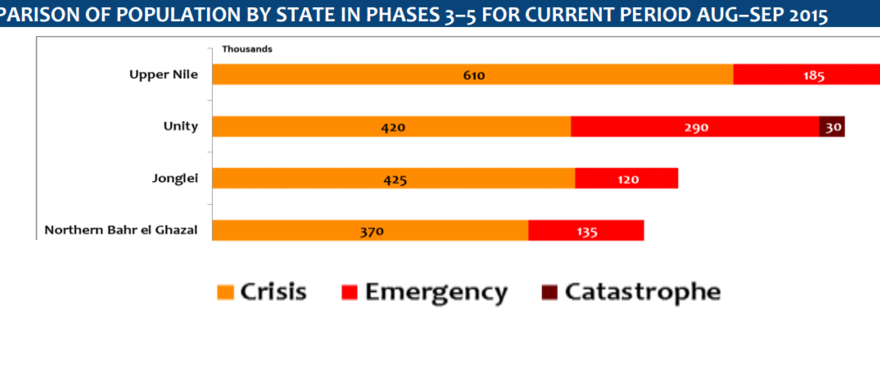Technical working group decides not to declare famine in S Sudan's Unity State

A joint technical working group of South Sudanese officials and UN agencies have decided not to formally declare a famine anywhere in South Sudan, while noting that a minority of people in Unity State – estimated at 30,000 – are already at the highest possible phase of classification on the group's five-point scale.
The Integrated Food Security Phase Classification (IPC) report for South Sudan was released today by the technical working group, which is hosted within the Bureau of Statistics and chaired by the Ministry of Agriculture. Its members include the UN Food and Agriculture Organization, the World Food Programme and several NGOs.
Since the war in South Sudan started nearly two years ago, this is the first time that an IPC analysis has found any parts of the population in phase five (“catastrophe”) on the five-point IPC scale.
Most conflict-affected people in Unity, Jonglei and Upper Nile states were classified in phase four or five ('crisis' or 'emergency'), and only an estimated 30,000 people in Unity State are considered at the 'catastrophe' stage.
The technical group admitted in its report that it was hard to get data from conflict zones and the report itself contains a number of contradictions.
According to a bar graph in the report titled “Comparison of Population by State in Phases 3-5 for Current Period Aug-Sep 2015,” there are 420,00 people in Unity State in Phase 3, 290,000 in Phase 4 and 30,000 in Phase 5.
But a table showing the same data puts the 30,000 in the 'Emergency' column and not in the 'Famine' column even while stating in a footnote with an asterisk that 30,000 people are at IPC Phase 5.
The footnote makes a distinction between 'Catastrophe' and 'Famine' – two words both associated with IPC Phase 5 – saying that famine is only declared if more than 20% of households are classified as “in catastrophe,” which refers to lack of food, plus a high death rate of 2/10,000/day.
In a press statement, the UN agencies FAO, WFP and UNICEF referred to “the brink of famine” and said the situation “could deteriorate to famine” without saying that there is actally a famine currently. The report itself says that hunger is particularly acute in Leer, Guit, Koch and Mayendit counties of Unity State, while lacking detailed data from these areas, adding, “there is likelihood of a famine occurring in the next few months if urgent humanitarian access is not provided.”
For its part, the government released a statement coinciding with the release of the report saying “there is localized concern in some part of southern Unity.” The statement from the Deputy Minister of Agriculture recommended urgent support for access to Leer, Guit, Koch and Mayendit counties.
Several aid agencies recently pulled out of Leer after their compounds were looted and their staff threatened.
A rebel official speaking to Radio Tamazuj from Leer County today by satellite phone claimed that government troops continue to carry out attacks on civilians in the area, many of whom have fled to remote islands or swamps.
Earlier this week the army spokesman accused the rebels of shelling their positions in Leer town.
The full IPC report is available here.